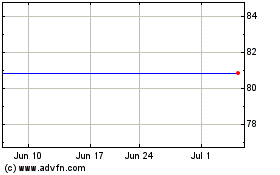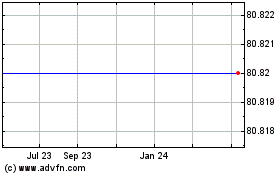CORRECT: IN THE PIPELINE: Sensor Could Help Keep Heart-Failure Patients Home
May 24 2011 - 3:32PM
Dow Jones News
Heart-failure patients have a hard time avoiding hospitals, but
a new implantable sensor could help by giving doctors data to catch
worsening symptoms and guide treatment while patients are still
home.
A private company called CardioMEMS Inc. makes the wireless
device, which detects increasing artery pressure that can presage
fluid retention that often leads to hospitalization. By relaying
this data to doctors daily over a secure website, the hope is
patients can adjust their medication to improve treatment and ward
off trips to the hospital.
The device is under review with the U.S. Food and Drug
Administration and could be approved late this year. St. Jude
Medical Inc. (STJ) stands to benefit because it bought 19% of
CardioMEMS through a $60 million equity investment last year and
has an exclusive right to buy the rest for $375 million.
Heart failure, which can be brought on by problems like high
blood pressure or damage from heart attacks, afflicts nearly 6
million Americans and leads to more than 1 million U.S.
hospitalizations each year. A 2009 study published in the New
England Journal of Medicine showed more than a quarter of Medicare
recipients with heart failure end up re-hospitalized within 30 days
following an earlier stay. These visits rack up billions of dollars
in costs.
"The burden is really enormous," said William Abraham, director
of cardiovascular medicine at the Ohio State University Medical
Center. He helped lead the key trial for CardioMEMS' sensors and
has received consulting fees from that company, St. Jude and
Medtronic Inc. (MDT).
Failing hearts don't pump well enough, and patients are often
managed with drugs and implantable defibrillators, depending on
their condition. Doctors say it's easy to monitor patients for
problems when they're hospitalized, but that monitoring methods
used outside are either imprecise or don't provide early enough
warnings.
"In outpatients, you don't have quite a handle on what's going
on," said Larry Epstein, chief of electrophysiology at Brigham
& Women's Hospital in Boston.
The battery-free CardioMEMS sensor, which is implanted by
catheter in the pulmonary artery exiting the heart, takes its daily
reading when patients lay on a big pillow containing an antenna.
St. Jude--which expects to complete the CardioMEMS
purchase--declined to estimate the cost for this system, although
CardioMEMS founder and Chief Executive Jay Yadav suggested it could
fetch between $10,000 and $14,000.
In the CardioMEMS-funded trial of 550 previously hospitalized
heart-failure patients, those monitored daily with the sensor had a
39% reduction in hospitalizations related to heart failure at 15
months compared with patients who also had a device implanted, but
weren't managed based on daily pressure readings. There was a low
rate of complications.
Abraham, who estimated it costs $10,000 to $15,000 to
hospitalize heart-failure patients, noted that four patients in the
study had to be treated with sensors to avoid one hospitalization
at 15 months. Twice as many patients had to be treated with sensors
to avoid hospitalization at six months, suggesting a potential
trend toward cost-savings over time, he said.
Doctors believe the technology could be broadly used, although
there could be challenges replicating conditions from the study in
the real world. Liviu Klein, a heart-failure specialist at
Northwestern Memorial Hospital in Chicago who took part in the
study, said it takes at least an hour to implant the device,
raising manpower challenges if every eligible patient wants a
sensor. Klein also believes that, while the sensor itself is very
simple, there are some drawbacks such as the bulky pillow.
Still, the successful study and sensor's simplicity set this
device apart from other monitoring attempts, according to doctors.
In a closely watched effort Yadav said generated important lessons,
Medtronic Inc. built a system called Chronicle, implanted like a
pacemaker, which failed its key study and never hit the market.
Medtronic is now working on a wireless, battery-powered device
that will take multiple daily readings from the pulmonary artery
while relaying information to a smart phone and other devices. But
it hasn't entered human trials yet and is likely several years
behind the CardioMEMS device. Boston Scientific Corp. (BSX)
launched a trial last year to study using sensors with
defibrillators to detect worsening heart failure, but isn't
divulging many details yet.
St. Jude, meantime, is also testing a more invasive sensor than
the CardioMEMS device that will measure pressure from a different
area.
(Jon Kamp covers medical devices for Dow Jones Newswires. He can
be reached at 617-654-6728 or by email at
jon.kamp@dowjones.com)
(TALK BACK: We invite readers to send us comments on this or
other financial news topics. Please email us at
TalkbackAmericas@dowjones.com. Readers should include their full
names, work or home addresses and telephone numbers for
verification purposes. We reserve the right to edit and publish
your comments along with your name; we reserve the right not to
publish reader comments.)
SJM (NYSE:STJ)
Historical Stock Chart
From Jun 2024 to Jul 2024

SJM (NYSE:STJ)
Historical Stock Chart
From Jul 2023 to Jul 2024
